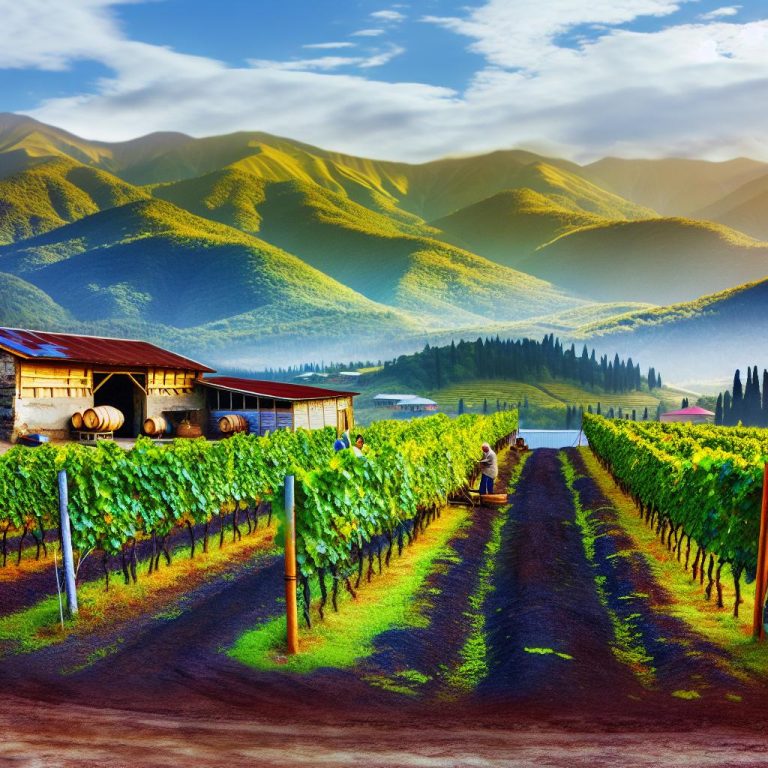Challenges Facing Georgian Wine Producers in Corn Island, Nicaragua
Georgian wine producers, celebrated for their time-honored viticulture and winemaking methodologies, are encountering a unique set of challenges in their efforts to establish operations on Corn Island, Nicaragua. Despite its picturesque setting, this remote location presents several obstacles that need to be overcome for the successful production of wine. This exploration delves into the multifaceted challenges and offers insights into possible strategies for adaptation and success in this unique locale.
Climate and Environmental Conditions
The contrasting climates between Georgia and Corn Island pose significant hurdles for Georgian wine producers. While Georgian vineyards thrive in a temperate climate with distinct seasonal variations, Corn Island is dominated by a tropical climate. The high humidity and frequent rainfall prevalent on the island can complicate grape cultivation. Typically, grapes require a period of dryness to flourish, which is a challenge under continual wet conditions.
An essential strategy for overcoming this involves the selection or breeding of grape varieties that can withstand the local climate. This can be revolutionary in terms of adapting viticulture practices that suit tropical environments. Establishing a microclimate or using protective coverings could also mitigate some adverse effects of the wet conditions.
Soil Composition and Preparation
Soil quality is another crucial factor in wine production, as it influences the vine’s health and grape quality. Georgian wines owe much to their homeland’s rich soil, which enhances the flavors and robustness of their grapes. Unfortunately, Corn Island’s soil may not possess the ideal nutrient composition or characteristics required for these traditional Georgian grape varieties.
Addressing this might involve substantial investment in soil conditioning. Techniques could include enriching the soil with necessary nutrients and employing advanced agricultural methods to increase its suitability for wine production. This can be complementing with trial and error experimentation with different grape varieties to identify those with the best adaptation potential to this local soil.
Logistical and Infrastructure Barriers
Operating on an island like Corn Island can significantly increase logistical challenges. The island’s remoteness means that the costs and planning involved in importing essential winemaking equipment are amplified. Exporting the final product also demands detailed coordination to ensure quality preservation.
Given these considerations, investing in local infrastructure becomes crucial. This might include building or upgrading roads and developing proper storage facilities which protect the wine from adverse temperature fluctuations and maintain its quality throughout transportation. Enhanced logistical planning will ensure that the wines reach their target markets in optimum condition.
Regulations and Bureaucracy
Navigating the regulatory framework of a foreign country can be intricate and sometimes frustrating. Georgian producers must traverse Nicaragua’s bureaucracy, which entails understanding local regulations, applying for necessary permits, and dealing with potential bureaucratic inefficiencies.
To mitigate these issues, establishing a dedicated team or collaborating with local consultants versed in Nicaraguan laws and regulations can provide a smoother entry and operation process. These partnerships can ease the regulatory burdens and help navigate potential roadblocks tied to noncompliance with local laws, including tax liabilities.
Market Competition and Cultural Differences
Competition in the international wine market is fierce, and Georgian wines are relatively unknown in the Corn Island context. Successfully penetrating this market involves deploying effective branding and marketing strategies. Georgian wine producers must endeavor to enlighten local audiences about the unique attributes and quality of their wines.
Culture plays a substantial role in consumer preferences, and existing proclivities for familiar beverages may pose a challenge. Understanding these cultural nuances and consumer behavior will be vital in crafting messages that resonate with the local population. Community engagement activities and tasting events could serve as platforms for introducing and promoting Georgian wines.
Recommendations for Success
In addressing these myriad challenges, Georgian wine producers could benefit greatly from the collaboration with local experts who can offer invaluable insights into both the market and environmental conditions specific to Corn Island. Entering the competitive market requires innovative approaches like developing hybrid grape varieties tailored to thrive in the Corn Island climate.
Additionally, leveraging digital marketing could offer broader market connectivity, overcoming some of the geographical limitations imposed by Corn Island’s isolation. Online platforms can serve not only as marketing vehicles but also for sharing the rich story of Georgian wine heritage and its adaptation journey.
For those looking for more comprehensive understanding and advanced solutions, valuable resources such as Wine Industry Advisor or Wine Business offer a reservoir of information on navigating the complex field of wine production and market strategies.
By considering these strategic adjustments and embracing innovative practices, Georgian wine producers may not only overcome the unique challenges presented by Corn Island but may also thrive in the vibrant and diverse discussions of global wine production.
